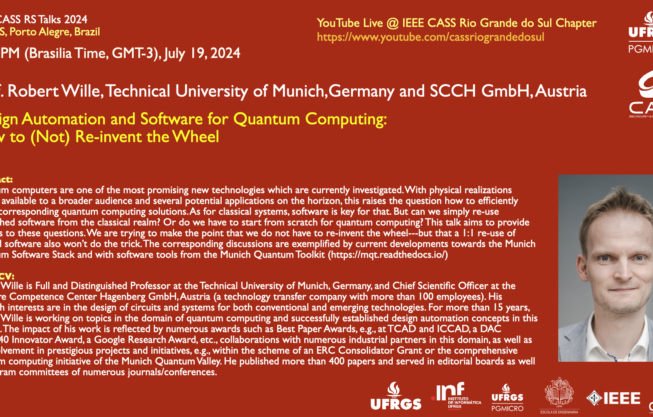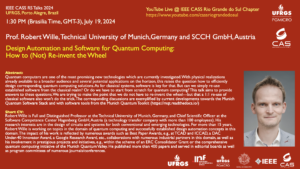
Publicado em: 15/07/2024
IEEE CASS RS Talks 2024
CASS Talks: Design Automation and Software for Quantum Computing: How to (Not) Re-invent the Wheel

No dia 19 de julho às 13:30h (Horário de Brasília) ocorrerá a palestra “Design Automation and Software for Quantum Computing: How to (Not) Re-invent the Whee” com Prof. Robert Wille, Technical University of Munich,Germany and SCCH GmbH, Austria.
Para acessar a palestra, clique aqui.
Abstract:
Quantum computers are one of the most promising new technologies which are currently investigated. With physical realizations already available to a broader audience and several potential applications on the horizon, this raises the question how to efficiently design corresponding quantum computing solutions. As for classical systems, software is key for that. But can we simply re-use established software from the classical realm? Or do we have to start from scratch for quantum computing? This talk aims to provide answers to these questions. We are trying to make the point that we do not have to re-invent the wheel—but that a 1:1 re-use of classical software also won’t do the trick. The corresponding discussions are exemplified by current developments towards the Munich Quantum Software Stack and with software tools from the Munich Quantum Toolkit (https://mqt.readthedocs.io/)
Short CV:
Robert Wille is Full and Distinguished Professor at the Technical University of Munich, Germany, and Chief Scientific Officer at the Software Competence Center Hagenberg GmbH, Austria (a technology transfer company with more than 100 employees). His research interests are in the design of circuits and systems for both conventional and emerging technologies. For more than 15 years, Robert Wille is working on topics in the domain of quantum computing and successfully established design automation concepts in this domain. The impact of his work is reflected by numerous awards such as Best Paper Awards, e.g., at TCAD and ICCAD, a DAC Under-40 Innovator Award, a Google Research Award, etc., collaborations with numerous industrial partners in this domain, as well as his involvement in prestigious projects and initiatives, e.g., within the scheme of an ERC Consolidator Grant or the comprehensive quantum computing initiative of the Munich Quantum Valley. He published more than 400 papers and served in editorial boards as well as program committees of numerous journals/conferences.

